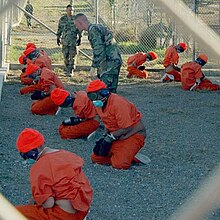British court 'threatened' by United States
Friday, February 6, 2009
Judges in England's High Court of Justice have said that the United States threatened to withdraw anti-terrorism intelligence cooperation if they revealed part of a Guantanamo Bay detainee's case.
However, UK Secretary of State for Foreign and Commonwealth Affairs David Miliband denied the threat had occurred, telling the House of Commons that it was usual practice for intelligence material to remain controlled by the country that collected it. He reaffirmed that the British government did not want the material released because doing so would "cause real and significant damage to the national security and international relations of this country".
Binyam Mohamed, a British resident but not a citizen, was arrested by U.S. forces in Pakistan in 2002. From there, he claims, he was moved to other locations where he was tortured on behalf of U.S. operatives (a process known as "extraordinary rendition") with the knowledge of UK intelligence agencies before being sent to the detention centre at Guantanamo Bay. The U.S. said he had planned a "dirty bomb" terrorist attack, but, after holding him for 4 years under the threat of the death penalty, dropped the charges.
Mohamed says that any evidence against him was based on what he said under torture and asked the High Court to force the government to reveal any documentation they held that would prove this. The judges have agreed, but have not published the material. Following the Foreign Secretary's statement to parliament, Mohamed's lawyers have written to the court to ask the judges to now publish. They say that, since Milliband has denied that the United States made the threat, the judges' decision to withhold it no longer applied.

Image: Shane T. McCoy.
Mohamed claims to have spent 550 days being tortured for information in Morocco. He says his genitals were repeatedly cut with a razor blade to make him confess. The court case in London is part of his bid to force the UK government to release evidence it holds that he claims shows the U.S. was directly involved in the torture. A British official was also present when he was tortured, he claims.
The court case and the British government's reaction to it comes at a time when British politicians are adjusting to a new relationship with their American counterparts. The UK was a solid supporter of former President George W. Bush's "war on terror", but the British government now faces building a relationship with the new U.S. administration which was elected with plans for a different approach to the subject. The British government has repeatedly denied that it was involved in "extraordinary rendition" and evidence otherwise would be politically damaging.
Sources
- Robert Verkaik and Nigel Morris. "Ministers 'misled' judges over torture evidence" — The Independent, February 6, 2009
- "Foreign secretary defends secrecy over terror suspect torture row" — The Daily Record, February 6, 2009
- "Court pressed on 'torture' case" — BBC News Online, February 6, 2009
- Matthew Moore. "Terror evidence row: Binyam Mohamed Q&A" — The Daily Telegraph, February 5, 2009
